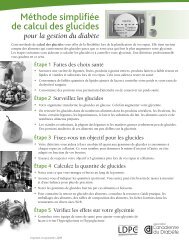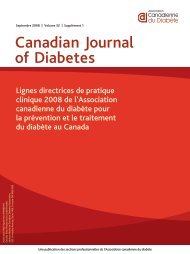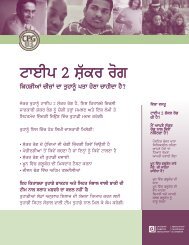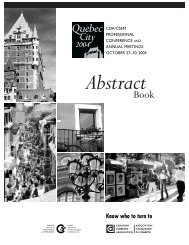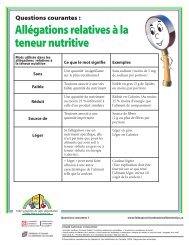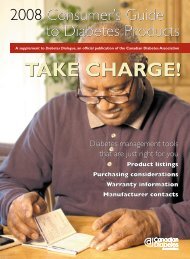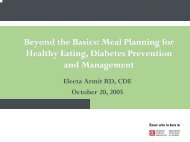2008 Clinical Practice Guidelines - Canadian Diabetes Association
2008 Clinical Practice Guidelines - Canadian Diabetes Association
2008 Clinical Practice Guidelines - Canadian Diabetes Association
You also want an ePaper? Increase the reach of your titles
YUMPU automatically turns print PDFs into web optimized ePapers that Google loves.
associated with improvement in the recognition of severe<br />
hypoglycemia, in the counterregulatory hormone responses,<br />
or both (42,67-73). Structured educational and psychobehavioural<br />
programs (e.g. blood glucose awareness training)<br />
may help improve detection of hypoglycemia and reduce frequency<br />
of severe hypoglycemia (74,75).<br />
RECOMMENDATIONS<br />
Insulin regimens for type 1 diabetes<br />
1.To achieve glycemic targets in adults with type 1 diabetes,<br />
multiple daily insulin injections (prandial [bolus]<br />
and basal insulin) or the use of CSII as part of an intensive<br />
diabetes management regimen is the treatment of<br />
choice [Grade A, Level 1A (6)].<br />
2. Rapid-acting insulin analogues (aspart or lispro), in combination<br />
with adequate basal insulin, should be considered<br />
over regular insulin to improve A1C while<br />
minimizing the occurrence of hypoglycemia [Grade B,<br />
Level 2 (9,11)] and to achieve postprandial glucose targets<br />
[Grade B, Level 2 (76)].<br />
3. Insulin aspart or insulin lispro should be used when CSII<br />
is used in adults with type 1 diabetes [Grade B, Level 2<br />
(29,30)].<br />
4.A long-acting insulin analogue (detemir, glargine) may be<br />
considered as an alternative to NPH as the basal insulin<br />
[Grade B, Level 2 (17-20)] to reduce the risk of hypoglycemia<br />
[Grade B, Level 2 (50), for detemir; Grade C, Level<br />
3 (51), for glargine], including nocturnal hypoglycemia<br />
[Grade B, Level 2 (50), for detemir; Grade D, Consensus,<br />
for glargine].<br />
Hypoglycemia<br />
5.All individuals with type 1 diabetes should be counselled<br />
about the risk and prevention of insulin-induced hypoglycemia,<br />
and risk factors for severe hypoglycemia<br />
should be identified and addressed [Grade D, Consensus].<br />
6. In individuals with hypoglycemia unawareness, the following<br />
strategies should be implemented to reduce the<br />
risk of hypoglycemia and to attempt to regain hypoglycemia<br />
awareness:<br />
• Increased frequency of SMBG, including periodic<br />
assessment during sleeping hours [Grade D, Consensus].<br />
• Less stringent glycemic targets with avoidance of<br />
hypoglycemia [Grade C, Level 3 (72,73)].<br />
• Consideration of a psychobehavioural intervention<br />
program (blood glucose awareness training), if available<br />
[Grade B, Level 2 (75)].<br />
OTHER RELEVANT GUIDELINES<br />
Targets for Glycemic Control, p. S29<br />
Monitoring Glycemic Control, p. S32<br />
Pharmacologic Management of Type 2 <strong>Diabetes</strong>, p. S53<br />
Hypoglycemia, p. S62<br />
In-hospital Management of <strong>Diabetes</strong>, p. S71<br />
Management of Acute Coronary Syndromes, p. S119<br />
Type 1 <strong>Diabetes</strong> in Children and Adolescents, p. S150<br />
Type 2 <strong>Diabetes</strong> in Children and Adolescents, p. S162<br />
<strong>Diabetes</strong> and Pregnancy, p. S168<br />
<strong>Diabetes</strong> in the Elderly, p. S181<br />
RELATED WEBSITE<br />
Health Canada information about animal insulin:<br />
http://hc-sc.gc.ca/dhp-mps/brgtherap/activit/fs-fi/qa_qr_<br />
insulin_02_2006_e.html Accessed September 1, <strong>2008</strong>.<br />
REFERENCES<br />
1. Pickup J, Mattock M, Kerry S. Glycaemic control with continuous<br />
subcutaneous insulin infusion compared with intensive<br />
insulin injections in patients with type 1 diabetes: meta-analysis<br />
of randomised controlled trials. BMJ. 2002;324:705.<br />
2. Tsui E, Barnie A, Ross S, et al. Intensive insulin therapy with<br />
insulin lispro: a randomized trial of continuous subcutaneous<br />
insulin infusion versus multiple daily insulin injection. <strong>Diabetes</strong><br />
Care. 2001;24:1722-1727.<br />
3. DeVries JH, Snoek FJ, Kostense PJ, et al; Dutch Insulin Pump<br />
Study Group. A randomized trial of continuous subcutaneous<br />
insulin infusion and intensive injection therapy in type 1 diabetes<br />
for patients with long-standing poor glycemic control.<br />
<strong>Diabetes</strong> Care. 2002;25:2074-2080.<br />
4. Hirsch IB, Bode BW, Garg S, et al; Insulin Aspart CSII/MDI<br />
Comparison Study Group. Continuous subcutaneous insulin<br />
infusion (CSII) of insulin aspart versus multiple daily injection<br />
of insulin aspart/insulin glargine in type 1 diabetic patients<br />
previously treated with CSII. <strong>Diabetes</strong> Care. 2005;28:533-538.<br />
5. Retnakaran R, Hochman J, DeVries JH, et al. Continuous subcutaneous<br />
insulin infusion versus multiple daily injections: the<br />
impact of baseline A1c. <strong>Diabetes</strong> Care. 2004;27:2590-2596.<br />
6. The <strong>Diabetes</strong> Control and Complications Trial Research Group.<br />
The effect of intensive treatment of diabetes on the development<br />
and progression of long-term complications in insulindependent<br />
diabetes mellitus. N Engl J Med. 1993;329:977-986.<br />
7. Nathan DM, Cleary PA, Backlund JY, et al; <strong>Diabetes</strong> Control<br />
and Complications Trial/Epidemiology of <strong>Diabetes</strong><br />
Interventions and Complications (DCCT/EDIC) Study<br />
Research Group. Intensive diabetes treatment and cardiovascular<br />
disease in patients with type 1 diabetes. N Engl J Med.<br />
2005;353:2643-2653.<br />
8. DeWitt DE, Hirsch IB. Outpatient insulin therapy in type 1<br />
and type 2 diabetes mellitus: scientific review. JAMA. 2003;<br />
289:2254-2264.<br />
9. Siebenhofer A, Plank J, Berghold A, et al. Short acting insulin<br />
analogues versus regular human insulin in patients with diabetes<br />
mellitus. Cochrane Database Syst Rev. 2006;(2):CD003287.<br />
10. Heller SR, Colagiuri S, Vaaler S, et al. Hypoglycaemia with<br />
insulin aspart: a double-blind, randomised, crossover trial in<br />
subjects with type1 diabetes. Diabet Med. 2004;21:769-775.<br />
11. Plank J, Siebenhofer A, Berghold A, et al. Systematic review<br />
and meta-analysis of short-acting insulin analogues in patients<br />
with diabetes mellitus. Arch Intern Med. 2005;165:1337-1344.<br />
12. Schernthaner G,Wein W, Shnawa N, et al. Preprandial vs. post-<br />
S49<br />
MANAGEMENT



